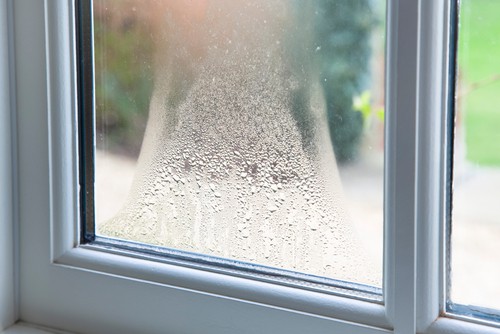
Navigating Humidity and Heat with Your Aircon System. Singapore’s geographical position near the equator gives it a tropical rainforest climate.
This results in consistently high temperatures and significant humidity levels throughout the year.
Understanding this unique climate is essential for residents and businesses, as it influences lifestyle choices, health, and building designs.
In such a climatic backdrop, air conditioning isn’t just about comfort; it’s a vital aspect of daily life.
It serves the dual purpose of cooling living spaces and reducing indoor humidity, making the hot and muggy conditions more bearable and protecting the integrity of buildings and electronics from moisture damage.
Read on – Navigating Humidity and Heat with Your Aircon System:
Understanding Humidity in Singapore
In Singapore, humidity levels often soar above 80%, creating a sticky atmosphere that can feel oppressive.
This high humidity affects everything from personal comfort to the preservation of infrastructure and impacts energy usage patterns in buildings.
The impact of such high humidity is multifaceted. It can lead to increased perspiration, dehydration, and general discomfort.
It means a higher propensity for mold and mildew growth in homes and offices, potentially causing health issues and damaging property.
Air Conditioning in a Tropical Climate
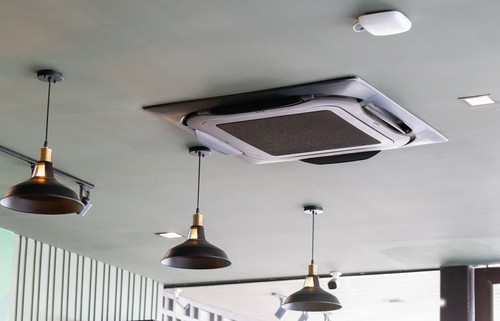
Tailoring Your Air Conditioning Use for Singapore’s Weather
Effective use of air conditioning in Singapore’s climate is not just about setting a comfortable temperature but also managing indoor humidity levels.
This requires a nuanced understanding of how air conditioning systems work and how they can be optimized for such a humid environment.
Challenges and Solutions for Air Conditioning in High Humidity
The principal challenge in such a climate is effectively removing moisture from the air without overcooling spaces.
Solutions include utilizing air conditioners with dehumidification features, ensuring regular maintenance for optimal performance, and employing smart thermostats for more precise control over indoor climate conditions.
Setting the Right Temperature and Humidity Balance
The ideal setting for air conditioners in Singapore’s climate strikes a balance between temperature and humidity.
This typically involves setting the thermostat between 24-26°C and maintaining indoor humidity levels at about 50-60%. Such settings ensure comfort while also being energy efficient.
Using tools like hygrometers can aid in monitoring indoor humidity levels.
Homeowners and facility managers can then adjust air conditioning settings based on these readings to maintain optimal indoor conditions for comfort and health and preserve interior furnishings and structures.
Energy-Efficient Air Conditioning Practices
In the face of Singapore’s humid weather, energy efficiency becomes paramount.
Efficient use of air conditioning includes employing programmable thermostats, using energy-efficient aircon models, and setting reasonable temperatures that do not overburden the system.
Strategies for reducing power consumption, even while staying cool, include supplementing air conditioning with fans, optimizing the usage of blinds and curtains to reduce heat gain, and scheduling aircon use during off-peak hours if possible.
Regular Maintenance for Optimal Performance
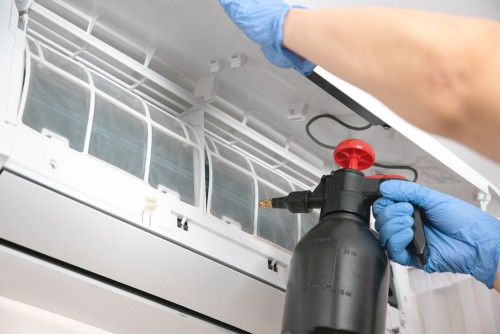
Importance of Routine Aircon Servicing in Humid Climates
The humidity in Singapore puts additional strain on air conditioning systems, making routine aircon servicing a necessity rather than a luxury.
Regular servicing ensures that air conditioning systems are running as efficiently as possible and helps to extend their lifespan.
DIY Maintenance Tips for Homeowners
Homeowners can undertake simple maintenance tasks such as cleaning air filters, checking for blockages in the drainage system, and ensuring the outdoor unit is debris-free.
These small actions can significantly impact the efficiency and effectiveness of an air conditioning system.
Enhancing Indoor Air Quality in Humid Conditions
Combating Mold and Mildew in High Humidity
Mold and mildew thrive in humid conditions and can be a health hazard. To combat this, it’s essential to maintain optimal humidity levels indoors.
This can be done through regular air conditioning use, employing dehumidifiers in particularly damp areas, and ensuring adequate ventilation.
Ventilation Strategies to Improve Indoor Air Quality
While air conditioning is essential, it should be complemented with good ventilation strategies.
This includes using exhaust fans in kitchens and bathrooms, periodically opening windows to let in fresh air, and using air purifiers to enhance air quality.
Dealing with Common Humidity-Related Aircon Issues
Common issues that air conditioners face in humid weather include reduced efficiency, increased condensation, and potential growth of mold within the unit.
Regular checks can help in early detection and resolution of these problems.
For more complex problems, such as significant water leaks, refrigerant issues, or electrical faults, it’s advisable to seek professional aircon repair services.
Professionals have the expertise and equipment to resolve these issues safely and effectively.
Smart Thermostats and Climate Control Technology
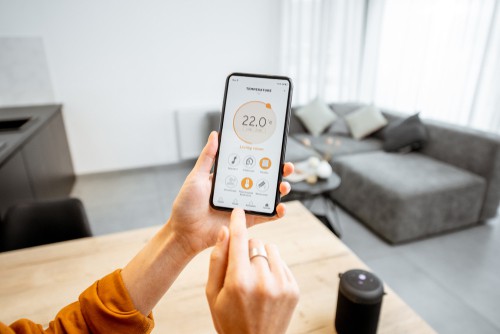
Smart thermostats and climate control technologies offer more precise control over indoor conditions.
They can adjust air conditioning settings based on real-time data, optimizing comfort and energy efficiency.
The advancement in air conditioning technology, including integrating smart thermostats and IoT-enabled devices, has transformed how we manage indoor climates.
These technologies allow for more targeted and efficient climate control, particularly beneficial in Singapore’s challenging humidity and heat.
Health Considerations in a Humid Climate
Impact of Humidity on Health and Comfort
Constant exposure to high humidity can exacerbate health issues such as respiratory problems, allergies, and skin conditions.
It also contributes to general discomfort, affecting sleep patterns and overall well-being.
Preventing Health Issues Related to High Humidity
Maintaining a balanced indoor humidity level is crucial to prevent such health issues.
This involves the strategic use of air conditioning and dehumidifiers, ensuring adequate ventilation, and using air purifiers to reduce allergens in the air.
Seasonal Variations in Singapore and Their Impact
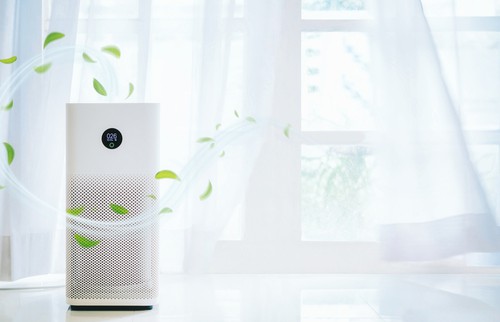
Though Singapore does not experience drastic seasonal changes, there are variations in rainfall and humidity levels throughout the year.
The rainy season typically sees even higher humidity, while the drier season might bring slightly lower humidity levels.
Adjusting Air Conditioning Use Across Different Seasons
Understanding these seasonal variations is important for adjusting the use of air conditioning.
During the rainy season, more emphasis might be needed on dehumidification, while in drier seasons, maintaining comfortable indoor temperatures could be the priority.
Frequently Asked Questions
What are the best aircon settings for Singapore’s climate?
In Singapore’s humid climate, the ideal aircon settings for comfort and efficiency are typically between 24-26°C, with humidity levels maintained at 50-60%.
How can I reduce humidity in my home without overusing the aircon?
To reduce humidity without over-reliance on air conditioning, use dehumidifiers, ensure good ventilation, and employ fans to help circulate the air.
What are the signs that my aircon is not effectively handling humidity?
Signs that an aircon is not effectively handling humidity include persistent musty odors, excessive condensation on windows, or a general feeling of dampness in the air.
How often should aircon units be serviced in Singapore?
In Singapore, it is advisable to service aircon units every 3-6 months to ensure they function efficiently and effectively in the humid climate.
Navigating Humidity and Heat with Your Aircon System – Conclusion
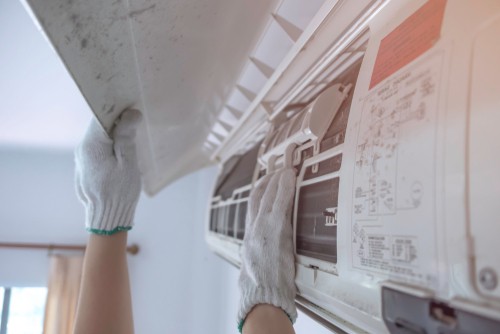
Effectively managing heat and humidity in Singapore’s tropical climate is a multifaceted challenge.
It involves not only the right use of air conditioning but also regular maintenance, understanding seasonal variations, and employing complementary strategies like dehumidifiers and smart climate control technologies.
By adopting these strategies, residents and businesses in Singapore can enjoy a more comfortable, healthy, and efficient indoor environment, successfully navigating the challenges posed by the region’s hot and humid climate.
Are you seeking a professional and reliable aircon services company in Singapore? Contact us today!
